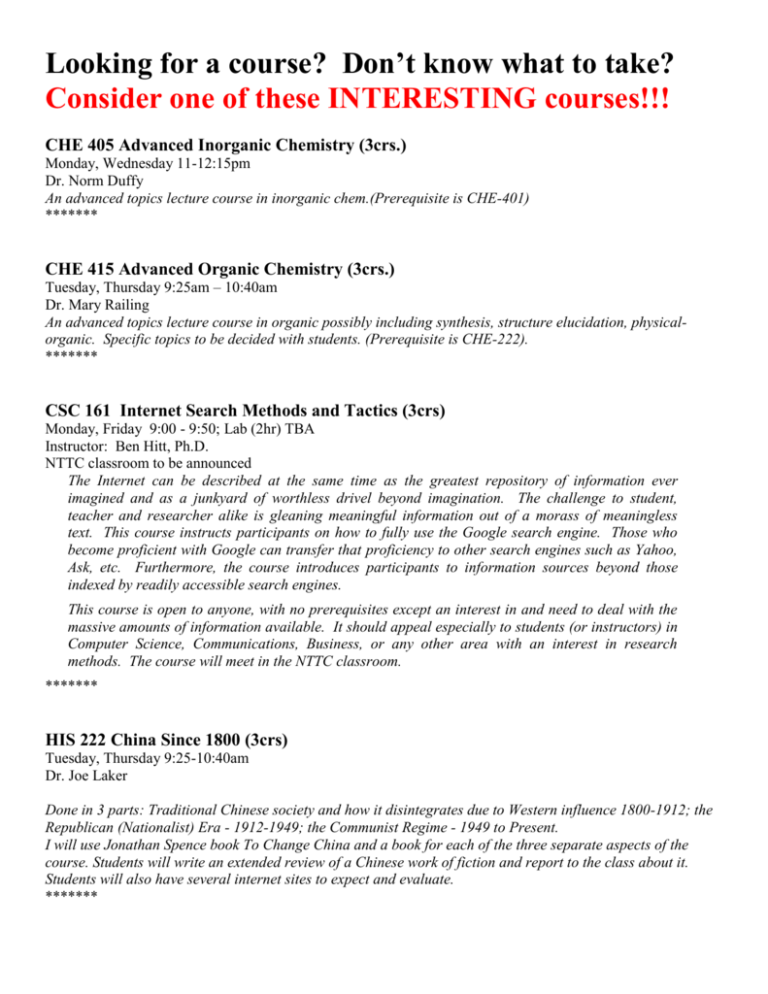Unique Courses:
advertisement

Looking for a course? Don’t know what to take? Consider one of these INTERESTING courses!!! CHE 405 Advanced Inorganic Chemistry (3crs.) Monday, Wednesday 11-12:15pm Dr. Norm Duffy An advanced topics lecture course in inorganic chem.(Prerequisite is CHE-401) ******* CHE 415 Advanced Organic Chemistry (3crs.) Tuesday, Thursday 9:25am – 10:40am Dr. Mary Railing An advanced topics lecture course in organic possibly including synthesis, structure elucidation, physicalorganic. Specific topics to be decided with students. (Prerequisite is CHE-222). ******* CSC 161 Internet Search Methods and Tactics (3crs) Monday, Friday 9:00 - 9:50; Lab (2hr) TBA Instructor: Ben Hitt, Ph.D. NTTC classroom to be announced The Internet can be described at the same time as the greatest repository of information ever imagined and as a junkyard of worthless drivel beyond imagination. The challenge to student, teacher and researcher alike is gleaning meaningful information out of a morass of meaningless text. This course instructs participants on how to fully use the Google search engine. Those who become proficient with Google can transfer that proficiency to other search engines such as Yahoo, Ask, etc. Furthermore, the course introduces participants to information sources beyond those indexed by readily accessible search engines. This course is open to anyone, with no prerequisites except an interest in and need to deal with the massive amounts of information available. It should appeal especially to students (or instructors) in Computer Science, Communications, Business, or any other area with an interest in research methods. The course will meet in the NTTC classroom. ******* HIS 222 China Since 1800 (3crs) Tuesday, Thursday 9:25-10:40am Dr. Joe Laker Done in 3 parts: Traditional Chinese society and how it disintegrates due to Western influence 1800-1912; the Republican (Nationalist) Era - 1912-1949; the Communist Regime - 1949 to Present. I will use Jonathan Spence book To Change China and a book for each of the three separate aspects of the course. Students will write an extended review of a Chinese work of fiction and report to the class about it. Students will also have several internet sites to expect and evaluate. ******* HIS 310 Eastern Europe Since Napoleon (3crs) Monday, Wednesday, Friday 10-10:50am Dr. John Cox How do Poles survive the ambitions of their bigger neighbors, Germany and Russia? How did the Hungarians preserve their identity within the Austrian Empire? How do you tell a Czech from a Slovak? What's the difference between Baltic and Balkan? For discussions of these and other electrifying topics (eroticism under Stalin, refugees after World War II, and what Europeans really thought of Napoleon), try this course! HIS 310, which has not been taught since 1999, includes two fabulous novels and a memoir but no Albanians! (Inside joke for frequent students of Dr. Cox.) ******* HIS 384/RST 384 Islamic Societies (3crs) Monday, Wednesday, Friday 11-11:50am Dr. John Cox and Dr. Kris Willumsen In this team-taught course, students will encounter the salient points of Islamic theology and religious practice. These include: monotheism, revelation, social responsibility, worship and mysticism, and the Sharia or law. Key political institutions, cultural, and historical developments will also be examined. These include: the spread of Islam, the creation of new empires and states, interaction between Muslim and Christian cultures, and art and architecture. Assigned readings range from Islamic theology and spirituality, the history of the Middle East (esp. Arab and Ottoman societies), to a Lebanese novel. This course counts for the RST upper-level core or for a non-western requirement for HIST majors. ******* PSY 226 Organizational Behavior (3 crs) [cross-listed with MGT 226 Organizational Behavior] Monday, Wednesday, Friday 10-10:50am Dr. Debra Hull This course surveys individual and group behavior in work settings, covering topics such as motivation, leadership, teamwork, and occupational health. The goal is to help make organizations and the individuals who work in them more effective. The course will have a large experiential component. ******* PSY 315 Test and Measurements (3 crs) Monday, Wednesday 3-4:15pm Dr. Julie Osland Tests and Measurements in an upper-level psychology course. The purpose of the course is twofold. First, the course will introduce you to the key concepts necessary for understanding psychological and educational testing so that you can be an informed consumer as either a taker or administrator of tests. Second, the course will introduce you to important tests in areas such as personality, ability, and intelligence. ******* PSY 350 Health Psychology (4 crs) Monday, Wednesday 1-2:40pm Dr. Michael Kirkpatrick An investigation of social and behavioral factors that promote health, as well as those contributing to illness and behaviors related to illness. Research methods within this developing field are stressed. Students will develop projects with emphasis on 1) using applied behavior analysis to modifying health, sport, and fitness behaviors in individuals (single subject and small-n designs), 2) assessing the effects of imagery and meditation on physiology and performance, 3) reviewing specialized literatures in areas of interest to students who may later (or concurrently) pursue directed research in behavioral health topics. Prerequisites: PSY 110, Research methods (PSY-211), and Statistics (PSY-115) ******* PSY 300-02 Directed Research (2 crs) Days and times are TBA Under the direction of Dr. Kirkpatrick, students design and carry out empirical research in health psychology. This course will dovetail with health psychology this term (although each stands alone), exploring applications of applied behavior analysis in health, sport, and fitness. Some research topics currently under investigation in the lab include measurement of imagery and self-talk as covert behaviors and their effects on overt (actual) performance, evaluation of changes in perceived exertion with reinforcement contingencies, learning to discriminate heart rate and other somatic events via contingent feedback, and the use of simple acoustic cues to shape topographically complex behavior. Contact the instructor for a list of ongoing projects. Ambitious students are also invited to develop their own topics tangential to these themes (these should be discussed prior to enrolling to determine their appropriateness to the setting). Prerequisite: PSY-211 or permission of the instructor. ******* PWR 254 Flash Web Animation (3crs.) Tuesday, Thursday 1:35-2:50pm Instructor: Mr. Richard Cain Emphasis on designing, authoring, and managing more sophisticated websites focusing on animation principles, site architecture, navigation schemes, and high interactivity. Students will make extensive use of vector animation and authoring technologies such as Flash and ActionScript. Course will include the documented development and design of several multimedia web products. Writing and graphic design intensive. Prerequisites: none. RST 361-02 Buddhism (3crs) Monday 6-9pm Instructor: Dr. Kristopher Willumsen This introductory course in Buddhism will explore the world view and beliefs of the major schools of Buddhism. While attention will be given to Buddhist doctrines and to the historical spread of Buddhism from India to Japan, and increasingly on to Europe and America, the goal of the course is a personal appreciation of this religious tradition gained by reading classic statements, examining art, film, and architecture, and by testing several meditation practices. ****** RST 211 The Catholic Vision (3 crs) Tuesday, Thursday 3:00-4:15pm Instructor: Dr. David Hammond This course serves as an orientation to the minor. The course identifies what is distinctive about the Catholic vision and so will examine such fundamental issues as: the principle of sacramentality, the relationship of the person to the common good, the centrality of morality, the relationship of faith and reason, as well as a philosophy of the human person before God. This course is comprised of material drawn from the humanities, the natural and social sciences and theology. *******




